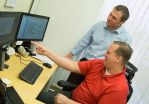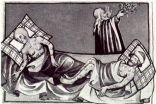(Press-News.org) Study after study has proven it true: exercise is good for you. But new research from University of Pennsylvania scientists suggests that exercise may have an added benefit for cancer patients undergoing chemotherapy.
Their work, performed in a mouse model of melanoma, found that combining exercise with chemotherapy shrunk tumors more than chemotherapy alone.
Joseph Libonati, an associate professor in the School of Nursing and director of the Laboratory of Innovative and Translational Nursing Research, was the senior author on the study, which appears in the American Journal of Physiology. His collaborators included the Penn Nursing's Geetha Muthukumaran, Dennis Ding and Akinyemi Bajulaiye plus Kathleen Sturgeon, Keri Schadler, Nicholas J. Thomas, Victor Ferrari and Sandra Ryeom of Penn's Perelman School of Medicine.
Exercise has long been recommended to cancer patients for its physical and psychological benefits. Libonati and colleagues were particularly interested in testing whether exercise could protect against the negative cardiac-related side effects of the common cancer drug doxorubicin. Though effective at treating a variety of types of cancer, doxorubicin has is known to damage heart cells, which could lead to heart failure in the long-term.
"The immediate concern for these patients is, of course, the cancer, and they'll do whatever it takes to get rid of it," Libonati said. "But then when you get over that hump you have to deal with the long-term elevated risk of cardiovascular disease."
Previous studies had shown that an exercise regime prior to receiving chemotherapy could protect heart cells from the toxic effects of doxorubicin, but few had looked to see whether an exercise regimen during chemotherapy could be beneficial.
To do so, Libonati's team set up an experiment with four groups of mice. All were given an injection of melanoma cells in the scruffs of their neck. During the next two weeks, two of the groups received doxorubicin in two doses while the other two groups received placebo injections. Mice in one of the treated groups and one of the placebo groups were put on exercise regimens, walking 45 minutes five days a week on mouse-sized treadmills, while the rest of the mice remained sedentary.
After the two-week trial, the researchers examined the animals' hearts using echocardiogram and tissue analysis. As expected, doxorubicin was found to reduce the heart's function and size and increased fibrosis — a damaging thickening of tissue. Mice that exercised were not protected from this damage.
"We looked, and the exercise didn't do anything to the heart — it didn't worsen it, it didn't help it," Libonati said. "But the tumor data –- I find them actually amazing."
The "amazing" result was that the mice that both received chemotherapy and exercised had significantly smaller tumors after two weeks than mice that only received doxorubicin.
Further studies will investigate exactly how exercise enhances the effect of doxorubicin, but the Penn team believes it could be in part because exercise increases blood flow to the tumor, bringing with it more of the drug in the bloodstream.
"If exercise helps in this way, you could potentially use a smaller dose of the drug and get fewer side effects," Libonati said.
Gaining a clearer understanding of the many ways that exercise affects various systems of the body could also pave the way for developing drugs that mimic the effects of exercise.
"People don't take a drug and then sit down all day," Libonati says. "Something as simple as moving affects how drugs are metabolized. We're only just beginning to understand the complexities."
INFORMATION:
The research was supported by the National Cancer Institute, National Heart Lung and Blood Institute, Biobehavioral Research Center at Penn, National Center for Research Resources and National Center for Advancing Translational Sciences.
Exercise boosts tumor-fighting ability of chemotherapy, Penn team finds
2014-09-18
ELSE PRESS RELEASES FROM THIS DATE:
Researchers study vital 'on/off switches' that control when bacteria turn deadly
2014-09-18
MADISON, Wis. — No matter how many times it's demonstrated, it's still hard to envision bacteria as social, communicating creatures.
But by using a signaling system called "quorum sensing," these single-celled organisms radically alter their behavior to suit their population. In short, some bacteria "know" how many of them are present, and act accordingly.
Once the population of quorum-sensing bacteria reaches the millions, it may change from innocuous to pathogenic, or from unhelpful to helpful. The quorum-sensing messages are carried in small molecules that the bacteria ...
Researchers develop unique waste cleanup for rural areas
2014-09-18
PULLMAN, Wash. - Washington State University researchers have developed a unique method to use microbes buried in pond sediment to power waste cleanup in rural areas.
The first microbe-powered, self-sustaining wastewater treatment system could lead to an inexpensive and quick way to clean up waste from large farming operations and rural sewage treatment plants while reducing pollution.
Professor Haluk Beyenal and graduate student Timothy Ewing in the Voiland College of Engineering and Architecture discuss the system in the online edition of Journal of Power Sources ...
Video games could dramatically streamline educational research
2014-09-18
PULLMAN, Wash. – "Seeking educational curriculum researchers. Humans need not apply."
A Washington State University professor has figured out a dramatically easier and more cost-effective way to do research on science curriculum in the classroom – and it could include playing video games.
Called "computational modeling," it involves a computer "learning" student behavior and then "thinking" as students would. Rich Lamb, who teaches science education at WSU's College of Education, said the process could revolutionize the way educational research is done.
Lamb's research ...
Tree rings and arroyos
2014-09-18
Boulder, Colo., USA – A new GSA Bulletin study uses tree rings to document arroyo evolution along the lower Rio Puerco and Chaco Wash in northern New Mexico, USA. By determining burial dates in tree rings from salt cedar and willow, investigators were able to precisely date arroyo sedimentary beds 30 cm thick or greater. They then combined this data with aerial imagery, LiDAR, longitudinal profiles, and repeat surveys to reconstruct the history of these arroyos.
Arroyos are deep, oversized channels that have vertical or steeply cut walls made up of silt, clay, or sand. ...
Spouse's personality influences career success, study finds
2014-09-18
As people spend more and more time in the workplace, it's natural for co-workers to develop close bonds — what's often referred to as a "workplace spouse" or an "office wife."
But when it comes to pay raises, promotions and other measures of career success, it's the husband or wife at home who may be exerting a bigger influence on workplace performance, suggests new research from Washington University in St. Louis. "Our study shows that it is not only your own personality that influences the experiences that lead to greater occupational success, but that your spouse's ...
Marcellus drilling boom may have led to too many hotel rooms
2014-09-18
Drilling in Pennsylvania's Marcellus Shale region led to a rapid increase in both the number of hotels and hotel industry jobs, but Penn State researchers report that the faltering occupancy rate may signal that there are now too many hotel rooms.
"Demand is still high in many of the counties in the Marcellus Shale region, but the occupancy rate is starting to come down," said Daniel Mount, an associate professor in hospitality management. "The case could be made that this is a sign that hotels were overbuilt."
Marcellus drilling operations generated approximately $685 ...
Survey: Fortune 500 employees can expect to pay more for health insurance
2014-09-18
Employees working for Fortune 500 companies can expect to pay higher employee contributions for their health insurance, according to a survey of chief human resource officers about the impact of the Patient Protection and Affordable Care Act (also known as PPACA or Obamacare) conducted by the Darla Moore School of Business at the University of South Carolina this past May/June.
Patrick Wright, a professor in strategic human resource management, directs the annual the HR@Moore Survey of Chief HR Officers. The survey is distributed to more than 560 CHROs of Fortune 500 ...
Agricultural fires in the Ukraine
2014-09-18
Numerous fires (marked with red dots) are burning in Eastern Europe, likely as a result of regional agricultural practices. The body of water at the lower left of this true-color Moderate Resolution Imaging Spectroradiometer (MODIS) image is the Sea of Azov. The Sea is bordered by Ukraine to the northwest, west and southwest and by Russia to the northeast, east, and southeast. To its left is the Black Sea.
The location, widespread nature, and number of fires suggest that these fires were deliberately set to manage land. Farmers often use fire to return nutrients to the ...
Professional recommendations against routine prostate cancer screening have little effect
2014-09-18
DETROIT – The effect of guidelines recommending that elderly men should not be routinely screened for prostate cancer "has been minimal at best," according to a new study led by researchers at Henry Ford Hospital.
The study, published as a research letter online in JAMA Internal Medicine, focused on the use of PSA – prostate-specific antigen – to test for prostate cancer.
"We found that the effect of the guidelines recommending against the routine screening of elderly men in particular has been minimal at best," says Jesse Sammon, D.O., a researcher at Henry Ford's Vattikuti ...
New insights on an ancient plague could improve treatments for infections
2014-09-18
DURHAM, N.C. – Dangerous new pathogens such as the Ebola virus invoke scary scenarios of deadly epidemics, but even ancient scourges such as the bubonic plague are still providing researchers with new insights on how the body responds to infections.
In a study published online Sept. 18, 2014, in the journal Immunity, researchers at Duke Medicine and Duke-NUS Graduate Medical School Singapore detail how the Yersinia pestis bacteria that cause bubonic plague hitchhike on immune cells in the lymph nodes and eventually ride into the lungs and the blood stream, where the infection ...





